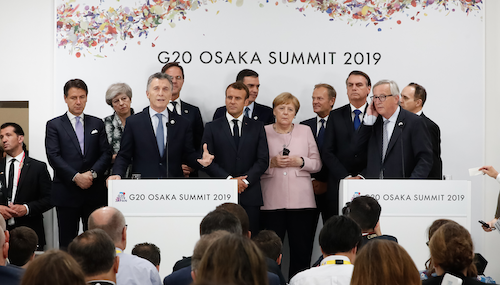How will the EU-Mercosur trade deal affect Brazil’s forests? Q&A with João Shimada
When the European Union announced a landmark deal with Latin America’s largest trade bloc, Mercosur on June 28, political leaders on both sides of the Atlantic celebrated the decision. But critics contend the agreement could fuel further environmental degradation in countries like Brazil, where beef production and other forms of agriculture are blamed for rising rates of deforestation. EII Research Associate João Shimada spent more than 20 years in Brazil’s agrobusiness sector and now works to promote low-emission development strategies in rural communities across the Amazon. He says that if properly implemented the deal could help to increase incentives among farmers to embrace sustainable practices. He spoke from his home in Cuiaba in the Brazilian state of Mato Grosso.

What’s in the agreement?
In general terms, the EU has committed to reducing import taxes on around 97% of mainly agricultural products from Mercosur. Countries in Mercosur have agreed to reduce taxes on 91% of imports from Europe. This mainly includes cars. The deal still needs to be approved by the EU Parliament and by legislative councils in the four Mercosur countries (Brazil, Argentina, Paraguay and Uruguay). It’s not easy to say how long this will take and what the final result will be. European producers are already planning ways to protect their markets, as are industries in Brazil and Argentina.
How could the agreement affect efforts to slow deforestation?
There are some who argue that increased international trade can help stop deforestation through tighter regulations. This is not entirely true. Domestic consumption accounts for about 80% of beef production in Brazil, so any restrictions that Europe puts in place will have only a limited impact on forests. In addition, beef for export to Europe will be coming from the south of Brazil, where larger companies with a national and international presence are based. Beef produced in the Amazon is mostly being sold domestically and to countries in Asia that tend not to ask as many questions about sourcing. But, in general I agree that participation in the EU market could have a positive impact in the field.
Can you elaborate?
In the last two to three years Brazil has seen a growing radicalization among its farmers, largely in opposition to environmental issues. This is the same sector that proved crucial to bringing Bolsonaro to office, and so his government remains very attuned to their demands.
But among producers, there are two distinct segments, one that is more aggressive in its opposition to environmental matters, and another, more closely aligned with international markets, that is more moderate. It is this latter group that convinced the Bolsonaro administration to remain in the Paris Climate Agreement, despite earlier signals that Brazil was considering a withdrawal. This same group also prevented the government from eliminating its Ministry of Environment. Both moves would have damaged Brazil’s standing with international trade partners.
This agreement can win the support of the moderates and strengthen their hand politically if it does lead to an overall increase in trade and a reduction of barriers. Under these conditions, I am sure that some environmental conditions would be seen by farmers as acceptable. Conversely, if the agreement is loaded with punitive environmental regulations that hamper trade, then it could have the effect of strengthening the radical wing and driving more moderates into their camp.
You mention a simmering hostility to environmental concerns. What are some other barriers to slowing deforestation?
The first thing to understand is that there are multiple factors driving deforestation. One of them is land speculation. An acre of forest land costs 5 to 10 times less than an acre of pasture land, and 10 to 30 times less than land that has been prepared to grow soy. Also, over the last 20 years conservationists created heightened expectations about the economic returns that forest preservation could bring. These ultimately were not realized, and this led to frustration among land owners. Finally, when we talk about deforestation, we are talking about the frontier. There are no roads, there is no healthcare. You can’t just grab your phone and call the police. It’s not an easy place to be. So, the main question is, even under these conditions, why are people moving there. The answer is opportunity.
You have a personal connection to this work, isn’t that right?
My family has been involved in deforestation for three generations. My grandfather immigrated from Japan during WWII. When he arrived in Brazil, he did what many other new arrivals did; he deforested land to plant coffee. My father then migrated to the north of Brazil to plant coffee. And in my turn, I moved to Mato Grosso to deforest a piece of land to plant pasture. So, this is my black background. Much like in the US a century ago, people in Brazil have and continue to look to the frontier for opportunity.
But you remain optimistic about the future of Brazil’s forests?
I think so. We have to look at this strategically. At separate events last week, I reminded audiences that we are in the midst of a huge transformation in agriculture driven by technology. We are in the eye of the hurricane … that will shape what agriculture will look like for the next 20 to 30 years. And in this process, many of the farmers employing unsustainable practices will go out of business, either because of a lack of access to the market, or a lack of access to credit or licenses. Our job is to try to shape this future.

